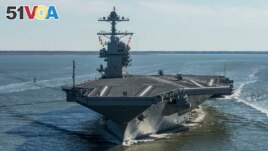05 October 2022
The United States' newest aircraft carrier is now on its first deployment to train with allies in the Atlantic. The move comes during a time of increased tensions around the world.
The aircraft carrier, USS Gerald R. Ford, began its deployment in the North Atlantic Ocean on Tuesday as the lead ship in a carrier strike group.
An aircraft carrier is a huge ship that serves as an air base at sea.

FILE - In this April 8, 2017 photo provided by the U.S. Navy, the USS Gerald R. Ford sails on the first of its sea trials to test various state-of-the-art systems on its own power for the first time, from Newport News, Va.
The strike group includes six ships from NATO countries, several U.S. warships and a submarine.
"We're going to use the entire Atlantic as our playpen," said Navy Captain Paul Lanzilotta. He is the ship's commanding officer.
The Navy calls the carrier "America's biggest and baddest warship." It has about 20 new technologies and a completely redesigned flight deck, the area where planes take off and land. The ship is able to launch 30 percent more flights than other U.S. carriers. The nuclear-powered carrier also has a new radar system.
The USS Ford is the world's largest warship. It weighs about 112,000 tons. Nimitz-class carriers are the next-largest, weighing 12,000 fewer tons. However, because of better design and technology, the USS Ford requires about 600 fewer sailors to operate than the Nimitz-class carriers.
The USS Ford is the first ship in the new "Ford class" of aircraft carriers. It is the first new class of aircraft carrier in more than 45 years. The lead ship of the Nimitz-class carriers, the USS Nimitz, is expected to be retired in the coming months. The launch of the USS Ford was delayed for years and went billions of dollars over budget.
The ship's current carrier strike group also includes forces from Canada, Denmark, Finland, France, Germany, the Netherlands, Sweden and Spain. It is the largest partnership in the Atlantic Ocean since World War II, the U.S. Navy said.
Lanzilotta said the North Atlantic deployment will help the group prepare for longer deployments that will begin next year. The group will be carrying out several military exercises in the North Atlantic, said Vice Admiral Dan Dwyer. He is the commander of the U.S. Second Fleet, which operates in the Arctic and North Atlantic Oceans.
Dwyer said, "we can no longer assume that geography provides us with the protection...that we've had in the past."
The deployment comes seven months after Russia invaded Ukraine. And it comes weeks after Russian President Vladimir Putin called for 300,000 additional troops to replace heavy losses.
While the war in Ukraine has hurt Russia's ground forces, its navy remains unweakened by the fight, said Bruce Jones. He is a professor at Stanford University and the director of the Brookings Institution's Project on International Order and Strategy.
"We saw a substantial increase in Russian naval activity in the lead-up to the Ukraine crisis in the Arctic ... so the North Atlantic is a very important place where we're going to end up having to deter Russia," he told VOA.
Jones said the possible damage to the Nord Stream oil pipelines in the Baltic Sea is an example of the kind of operation that Russia's naval forces might conduct.
"Arguably, we're in a more dangerous period, because Russia may well be looking to escalate beyond Ukraine as the situation in Ukraine gets worse," he said.
I'm Dan Novak.
Carla Babb reported this story for Voice of America. Dan Novak adapted it for Learning English.
_______________________________________________________________________
Words in This Story
playpen — n. a place where someone can do what they want
assume — v. to think that something is true, or probably true, without know it
geography — n. an area of study dealing with the position of places on the Earth
substantial –adj. large in amount or number
deter — v. to cause a person or group to decide not to do something
escalate — v. to become worse or more severe than it already is